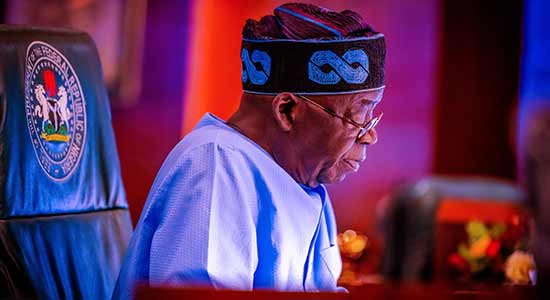Tinubu signs Minimum Wage Bill
President Bola Ahmed Tinubu has signed the new National Minimum wage bill into law. The president assented to the bill on Monday during a ceremony attended by the leadership of the National Assembly and members of Federal Executive Council at the Council Chambers, State House Abuja. Speaking after signing the bill, President Tinubu thanked the […]

president bola tinubu
President Bola Ahmed Tinubu has signed the new National Minimum wage bill into law.
The president assented to the bill on Monday during a ceremony attended by the leadership of the National Assembly and members of Federal Executive Council at the Council Chambers, State House Abuja.
Speaking after signing the bill, President Tinubu thanked the National Assembly for passing the bill expeditiously, saying “All I can say is thank you very much for the expeditious act”.
It would be recalled that the president and the leadership of organised labour comprising the Nigeria Labour Congress (NLC) and the Trade Union Congress (TUC) had last week agreed on a new minimum wage of N70,000 for Nigerian workers.
BBNaija S9: Ndinne pair wins first custodian of house challenge
Aunt, niece, twins, couple, siblings battle for BBNaija grand prize
They also agreed that the minimum wage will be reviewed every three years.
Last Tuesday, the National Assembly passed the bill seeking to increase the national minimum wage from N30,000 to N70,000 following the request from President Tinubu.
Both chambers of the National Assembly also reduced the time for periodic review of the national minimum wage from five years to three years with the passage of the bill.
Meanwhile, the federal government has signed a criminal investigation and repatriation agreement with the Kingdom of Spain as part of the ongoing efforts to fight crime and corruption in the country.
The Attorney General of the Federation and Minister of Justice, Lateef Fagbemi, disclosed this after the Federal Executive Council (FEC) meeting on Monday.
He said the agreement was signed in June 2022, but needed to be ratified at the FEC meeting.
He said: “As you all know, there are three stages. The first one is the investigation aspect. The second one is the prosecution of the sentencing and ensuring that you serve the sentence as a deterrence. Before now there have been what you called trans-border inhibitions, where somebody who is wanted in Nigeria for example, goes beyond the borders of Nigeria.
“To get him arrested; suppose you need any document that is not within but you know where he can be reached. How do we get this document? Somebody is trying to escape justice. How do you get him back and after sentencing, some countries have policies that say okay, let the convict come back home.
“So we have memos, one dealing with exchange of information including investigation. We have an agreement, which was signed way back in June 2022. So after the agreement, what the law requires is that you should come back and have it ratified. And it was presented to Council today and with the president, sitting as the chair, it was passed.
“The second one had to do with the exchange of assistance to bring back fugitives, people trying to escape from justice. So either you bring them to justice or take justice to them. So this second aspect of mutual assistance has been ratified.
“The third in the series has to do with after conviction what do we do? Some will say okay, if you have these convictions can you bring the person back home to serve his sentence here?
“So we have an agreement that either way, we can exchange persons sentenced to either serve their sentence here or there. So this has significantly shown that there is no hiding place for criminals. If they go outside the shores of the country they can be rest assured that the arms of the law are long enough to reach them,” he said.
